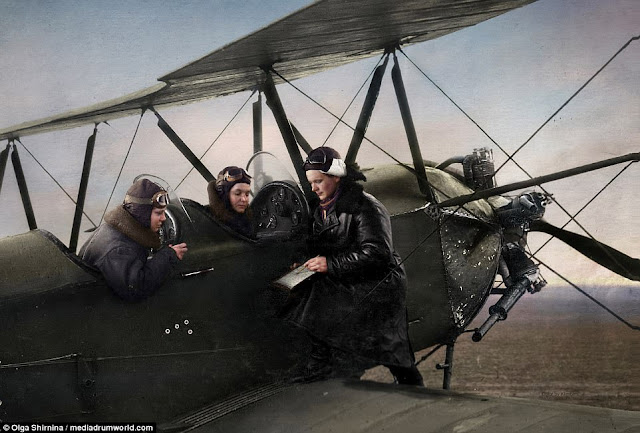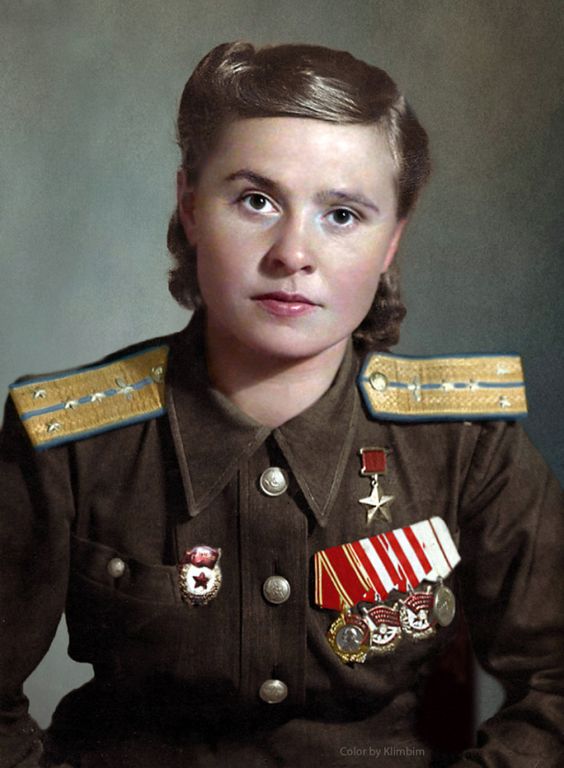Vixens of the Night
 |
| Pilots of the 588th Night Bomber Regiment, aka the "Night Witches," walk in front of a line of Po-2s at a Soviet air force base in 1944. |
Women played an important role in the Soviet front lines. While they did not form all-female infantry or tank divisions or anything like that, women did competently fill certain niche combat roles at a time when other armies did not. These included
sniper units and some air force squadrons.
By Order No. 0099, dated 8 October 1941, the Stavka (Soviet high command) created three all-female units in the Soviet Air Force. No. 588 Regiment was composed of night bombers. Issued at the absolute nadir of Soviet military forces, the order remained in effect throughout the war. The women flew, did their jobs, and some became national heroines.
 |
| Evdokiya Borisovna Pasko, a navigator in the Soviet all-female 46th Taman Guards Night Bomber Aviation Regiment, 325th Night Bomber Aviation Division, 4th Air Army on the 2nd Belorussian Front. A Moscow translator, Olga Shirnina, has made it her mission to colorize photos of the night witches, and the color images on this page are a product of her work. |
Women were recruited and trained to serve in the unit, which used old biplanes. It was a unique unit that earned its members fame. The women of this unit became known as the "
Night Witches."
 |
| A pilot in front of her Po-2 biplane. |
The women flew wood and canvas Polikarpov Po-2 biplanes, very durable weapons platforms. This was a 1928 design intended for use as training aircraft and for crop-dusting.
 |
| Yevdokia Bershanskaya (right), commander of the 46th Taman Guards Night Bomber Aviation Regiment, with her crew - Yevdokia Nosal and Nina Ulyanenko in 1942. |
It is the most produced biplane in all of aviation history and most likely the oldest design used to any effect during World War II. It was used in various missions during the war, including supplying partisans behind German lines. Production continued through the 1950s.
 |
| Planning a raid with the commander. Several pilots won the top Soviet honor, "Hero of the Soviet Union," which among other things carried a lifetime pension. |
The women (two per plane) would fly at ground level until near their target, ascend, and then shut off their engines, gliding down over their target so as not to draw anti-aircraft fire.
 |
| Heroes of the Soviet Union Rufina Gasheva and Nataly Meklin. |
This created a rustling sound that reminded Wehrmacht soldiers of broomsticks, so they nicknamed them "Nachthexen" (Night Witches).
 |
| Soviet pilot Yekaterina Ryabova. |
The "Night Witches" name stuck and is how they are commonly referred to now. The planes also produced a sound similar to a sewing machine, which is how the Finnish troops referred to them. The women sometimes flew multiple missions in a single night, once 18 missions in one night by a single crew. They were one tool of many that contributed to the final victory.
 |
| Night witches in 1944. |
The planes could not do a lot of damage in a single mission, as they carried only six 50 kg (110 lb) bombs. However, properly placed, those bombs could destroy planes or kill several men at a time in a tent. The unit's real usefulness was in spreading fear and disorientation among the enemy with their nuisance raids
 |
| Fighting in Russia means dealing with mud. Here, the Night Witches get out and push in 1944, when the front was moving west |
The group flew noisy old biplanes, and one of their objectives was simply to be annoying and deprive the front-line Wehrmacht troops of sleep. At this, they were extremely successful, thus earning their nickname from the Germans (and other epithets which you can well imagine).
 |
| Lilya Litvyak, Katya Budanova and Mariya Kuznetsov before a mission over Stalingrad. |
Some thirty women died during their missions; they carried no parachutes and, in general, flew so low that parachutes would have been useless anyway. The Germans were so impressed that they set up their own similar unit during the war, and the North Koreans continued the practice during the Korean conflict.
 |
| Captain Marina Raskova, Soviet Pilot and Navigator, one of the first women, awarded Hero of Soviet Union (1912-1943). |
At its largest size, the Night Witches had 40 two-person crews. It flew over 23,000 sorties and is said to have dropped 3,000 tons of bombs.
 |
| Soviet fighter pilot Lydia Litvyak. |
Personnel of the Night Witches included, among many others:
- Yevdokia Bershanskaya—Regimental Commander
- Yevgeniya Zhigulenko, Hero of the Soviet Union—Flight Commander
- Tat'yana Makarova, Hero of the Soviet Union—Flight Commander
- Nina Ul'yanenko, Hero of the Soviet Union—Flight Navigator
- Vera Bjelik
- Rufina Gasheva
- Polina Gelman
- Natalya Meklin
- Nadezhda Popova
- Yevgeniya Rudneva
- Irina Sebrova
 |
| Hero of the Soviet Union Maria Dolina. |
As one example of the many Night Witches, Maria Dolina flew seventy-two missions for the Night Witches bombing enemy ammunition depots, strong-points, tanks, artillery batteries, rail and water transports, and supporting Soviet ground troops. On August 18, 1945, Maria Dolina was awarded the title of the Hero of the Soviet Union, the highest honor anyone from the rank and file could receive. Receiving an award of Hero of the Soviet Union was roughly equivalent to receiving a Medal of Honor in the United States - you received a stipend, a bust of you was placed in your hometown, and there were other benefits.
 |
| Nadezhda Popova was a Russian female pilot during WWII. The German military called her one of the "Nachthexen", or "Night Witches" She flew 852 decoy missions in a canvas winged plane. Dropped food and medicine to Russian marines trapped on the beach at Malaya Zemlya (Novorossiysk in the Caucasus). She had to fly so low that she heard their cheers. After the mission, she found 42 bullet holes in her plane. Nadezhda passed away on July 8, 2013, at the age of 91. |
 |
| Natalya Meklin, a navigator with the Night Witches. |
2020















No comments:
Post a Comment